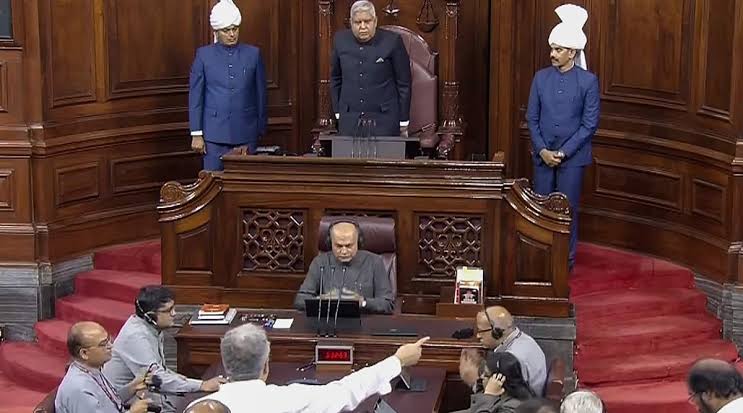


A government law officer cannot say that he does not stand by a law enacted by the parliament, the Supreme Court told Solicitor General Tushar Mehta on Wednesday [Aligarh Muslim University Through its Registrar Faizan Mustafa v Naresh Agarwal and ors].
A Constitution Bench of Chief Justice of India (CJI) DY Chandrachud and Justices Sanjiv Khanna, Surya Kant, JB Pardiwala, Dipankar Datta, Manoj Misra and Satish Chandra Sharma said that the parliament is supreme and eternal and a law officer stating that he does not endorse a law validly passed by the parliament, would be radical.The Court made the remark after SG Mehta said that he does not accept the amendment made to the Aligarh Muslim University Act in 1981 by which AMU was conferred minority status."Parliament is indestructible and it is a Union. It is irrespective of who espouses the Union government. As the SG you cannot say that you do not stand by the amendment. This will be a radical when the law officer tells us that he does not stand by what Parliament has done. As the Parliament of course another amendment can be brought, Parliament is supreme and eternal, indivisible entity under the democracy. How can you say you do not accept validity of the amendment," the CJI said.The SG then asked whether all Emergency era constitutional amendments have to be justified by law officers."That is why the 44th Amendment (which deleted many of the Emergency era amendments) came into being! To remedy all the evils," the CJI answered.The Court was hearing a batch of petitions concerning the minority status of Aligarh Muslim University (AMU).The questions of law involved in the case concerns the parameters for granting an educational institution minority status under Article 30, and whether a centrally-funded university established by parliamentary statute can be designated a minority institution.The matter was referred to a seven-judge in February 2019 by a bench led by then CJI Ranjan Gogoi.AMU was held to be a Central University by the Supreme Court in the 1968 case of S Azeez Basha vs Union of India. In the said case, the Court also held that a minority status under Articles 29 and 30 of the Indian Constitution cannot be conferred on a Central University.
However, the minority status of the institute was later reinstated by bringing in an amendment to the AMU Act of 1920. The amendment was brought about in the year 1981.This was challenged before the Allahabad High Court which in 2006 set aside the move as being unconstitutional, leading to the instant appeals by AMU before the Supreme Court.Notably, in 2016, the Central government withdrew its appeal in the matter.
TAGS: Supreme Court Solicitor General Parliament Chief Justice of India